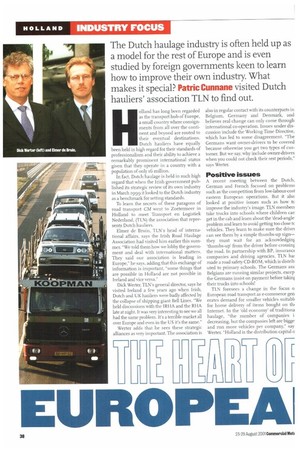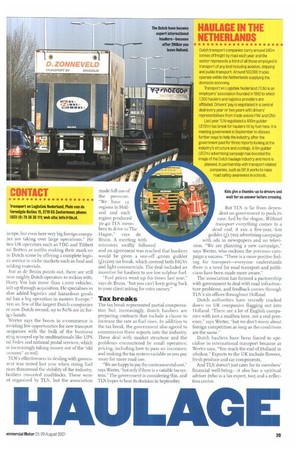The Dutch haulage industry is often held up as a
Page 38

Page 39

If you've noticed an error in this article please click here to report it so we can fix it.
model for the rest of Europe and is even studied by foreign governments keen to learn
how to improve their own industry. What makes it special? Patric Cunnane visited Dutch
hauliers' association TLN to find out.
Holland has long been regarded as the transport hub of Europe, a small country where consignments from all over the continent and beyond are routed to their eventual destinations. Dutch hauliers have equally been held in high regard for their standards of professionalism and their ability to achieve a remarkably prominent international status given that they operate in a country with a population of only 16 million.
In fact, Dutch haulage is held in such high regard that when the Irish government published its strategic review of its own industry in March 1999 it looked to the Dutch industry as a benchmark for setting standards.
To learn the secrets of these paragons of road transport CM went to Zoetermeer in Holland to meet Transport en Logistiek Nederland, (TLN) the association that represents Dutch hauliers.
Elmer de Bruin, TLN's head of international affairs, says the Irish Road Haulage Association had visited him earlier this summer. "We told them how we lobby the government and deal with international matters. They said our association is leading in Europe," he says, adding that this exchange of information is important, "some things that are possible in Holland are not possible in Ireland and vice versa."
Dick Werter, TLN's general director, says he visited Ireland a few years ago when Irish, Dutch and UK hauliers were badly affected by the collapse of shipping giant Bell Lines. "We held discussions with the IRHA and the RHA late at night. It was very interesting to see we all had the same problem. It's a terrible market all over Europe and even in the US it's the same."
Werter adds that he sees these strategic alliances as very important. The association is also in regular contact with its counterparts in Belgium, Germany and Denmark, and believes real change can only come through international co-operation. Issues under discussion include the Working Time Directive, which has led to some disagreement. "The Germans want owner-drivers to be covered because otherwise you get two types of customer. But we say, why include owner-drivers when you could not check their rest periods," says Werter.
Positive issues
A recent meeting between the Dutch, German and French focused on problems such as the competition from low-labour-cost eastern European operations. But it alsc looked at positive issues such as how tc improve the industry's image. TLN members take trucks into schools where children can get in the cab and learn about the 'dead-angle problem and learn to avoid getting too close tc vehicles. They learn to make sure the drives can see them by a simple thumbs-up sign— they must wait for an acknowledging 'thumbs-up' from the driver before crossing the road. In partnership with BP, insurancE companies and driving agencies, TLN has made a road safety CD-ROM, which is distrib utecl to primary schools. The Germans anc Belgians are running similar projects, excep the Germans insist on payment before talcini their trucks into schools!
TLN foresees a change in the focus o European road transport as e-commerce gen erates demand for smaller vehicles suitabl■ for home delivery of items bought on th, Internet. In the 'old economy' of traditiona haulage, "the number of companies i decreasing, but the companies left are bigge and run more vehicles per company," say Werter. "Holland is the distribution capital o :mope. but even here very big foreign compa.ies are taking over large operations." He ites UK operators such as TDG and Tibbett nd Britten as outfits making their mark on le Dutch scene by offering a complete logiscs service in niche markets such as food and uilding materials.
But as de Bruin points out, there are still orne mighty Dutch operators to reckon with. Harry Vos has more than 1, 000 vehicles, uilt up through acquisition. He specialises in alue added logistics and hazardous goods nd has a big operation in eastern Europe." yen so, few of the largest Dutch companies re now Dutch owned; up to go% are in forign hands.
Werter says the boom in e-commerce is roviding few opportunities for new transport Dmpanies with the bulk of the business eing scooped up by multinationals like UPS nd Fedex and national postal services, which re increasingly taking money out of the "old :onomy" as well.
TLN's effectiveness in dealing with governlent was tested last year when rising fuel rices threatened the stability of the industry. lauliers mounted roadblocks. These were ot organised by TLN, but the association
made full use of the pressure. "We have 12 regions in Holland and each region produced 30-40 MN _members to drive to The Hague," says de Bruin. A meeting with ministers swiftly followed
and an agreement was readied that hauliers would be given a one-off 400m guilder (Drzm) tax break, which covered both HGVs and light commercials. The deal included an incentive for hauliers to use low sulphur fuel.
"Fuel prices went up Go times last year," says de Bniin, "but you can't keep going back to your client asking for extra money."
Tax breaks
The tax break represented partial compensation but, increasingly, Dutch hauliers are preparing contracts that include a clause to increase the rate as fuel rises. In addition to the tax break, the government also agreed to commission three reports into the industry. These deal with market structure and the problems encountered by small operators; pricing, including how to pass on increases; and making the tax system variable so you pay more for more road use.
"We are happy to pay the environmental cost," says Werter, "but only if there is a variable tax systern." The government is considering this, and TLN hopes to hear its decision in September.
But TLN is far from dependent on government to push its case. Led by the slogan, Without transport everything comes to a
dead end, it ran a five-year, Gm guilder (L1.7m) advertising campaign with ads in newspapers and on television. "We are planning a new campaign," says Werter, who reckons the previous campaign a success. "There is a more positive feeling for transport—everyone understands there is a need for road transport and politicians have been made more aware."
The association has formed a partnership with government to deal with road infrastructure problems, and feedback comes through TLN's six offices throughout Holland.
Dutch authorities have recently cracked down on UK companies flagging out into Holland. "There are a lot of English companies with just a mailbox here, not a real presence," says Werter, "but we don't worry about foreign competition as long as the conditions are the same."
Dutch hauliers have been forced to specialise in international transport because as Wetter says, "You reach the end of Holland in 260km." Exports to the UK include flowers, fresh produce and car components.
And TLN doesn't just cater for its members' financial well-being----it also has a spiritual adviser (who is a tax expert, too) and a reflection centre.




























































































































